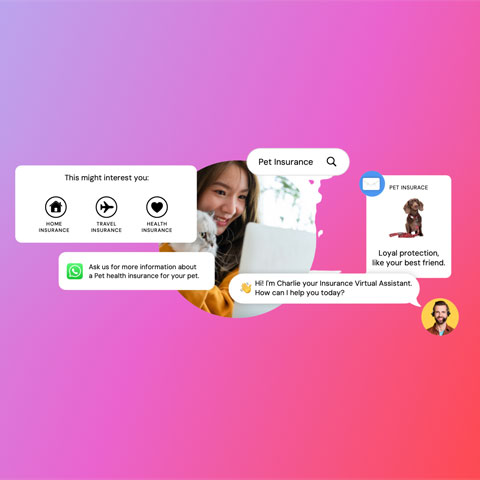Get CRM right: Methodology to Implement Effective CRM

Whatever CRM system you choose, implementing it correctly is essential to the success of any CRM project. To implement it correctly, you need an effective project methodology. This will minimise the risks and costs associated with CRM initiatives and achieve higher ROI by providing maximum user adoption. This whitepaper outlines the key factors you should consider when developing, choosing or implementing a project methodology for managing CRM projects.
Get the downloadBelow is an excerpt of "Get CRM right: Methodology to Implement Effective CRM". To get your free download, and unlimited access to the whole of bizibl.com, simply log in or join free. |

|
It’s a well established fact that a relatively high percentage of CRM projects fail to deliver the benefits expected by the business. Common causes cited for this include poor sponsorship, lack of defined requirements, and miscommunication between the project team and stakeholders. However, the most frequent cause of CRM project failure is the lack of adoption of a Project Management Methodology. Projects are more likely to succeed using a defined CRM Project Methodology because:
- It reduces the time spent completing project deliverables.
- Monitoring and controlling the project is more efficient, especially during the Execution phase.
- It reduces overall costs by saving time and effort to building deliverables.
- Change, risks and issues are reduced because the project is fully and clearly defined from the outset.
- Full quality assurance is in place throughout the project lifecycle to ensure requirements are met.
- By clarifying roles, responsibilities and delivery expectations, staff performance and motivation remains high.
This Project Methodology describes the phases, activities and tasks required to undertake a CRM project from beginning-to-end and gives you an appreciation of the steps needed to successfully manage projects through the project lifecycle.
Technique
This falls into two categories:
- The big pictures which are items that have a significant impact on the overall project.
- The small pictures where items are not immediately or directly consequential, but are still essential to the project, e.g. like motivating users to use the system.
The project methodology must include a project manager who will instigate a project management system consisting of:
- Timetable for each action
- Regular and periodic reviews of each action
- Resources – both human and tangible – assigned to each action to achieve the project goals
- Risks identification
- Change Management processes
Consensus
Within a CRM project there must be consensus among all involved in the project to ensure everyone is aiming for the same goals. This means making certain that all involved, from the top down, thoroughly understand the goals and the actions being implemented to achieve these goals. This can be achieved in four ways:
- Communication. Full emphasis of the importance and status of each action through regular communication with all involved.
- Involvement. Everyone working on specific projects to achieve goals must be closely associated with the planning and decision-making process.
- Implementation. As each action is being implemented, teams must be able to observe and note the effects of the actions as they take place.
- Improvement. Once the action has been implemented, those working on the project will no doubt discover aspects of the processes that can be improved.
Project Initiation
Project Initiation is the first phase in the project life cycle. Each project is initiated by defining its objectives, purpose and scope, justification and the solution to be implemented. Figure 2 shows the stages in the Project Initiation phase:
Define Project Scope
A project team should define the purpose and scope of the project, and then produce a business requirement specification.
Measurement of Success
A key element to any project is the ability to measure its success against the objectives defined for the project investment at outset. During the project initiation phase it is important to understand these objectives and work to define how success will be measured, drawing up a list of around six key ‘Success Factors’. These factors will help to define the Return on Investment and value achieved from any project, regardless of size or nature.
At the conclusion of the project, each factor should be reviewed and measured against initial objectives. This will enable all parties to evaluate the success of the overall project or its phases. Each ‘Success Factor’ should follow the SMART principal, that is:
Specific
Each factor must be clearly defined, ensuring there is no ambiguity about what is to be achieved.
Measurable
Each factor must be measurable to enable analysis between the target and achieved outcome, for example, ‘Increasing productivity’ is not measurable, whereas ‘increasing productivity by 20%’ is measurable given a baseline at outset.
Achievable
The factors need to be achievable using the allocated resources and agreed between all parties.
Realistic
Each factor must be realistic. To use the previous example, “increase productivity by 500%” may not be realistic based purely on an investment in CRM.
Timely
The measurement of each factor must be based on a specific time period to ensure all the goals are met. For example, “Increase productivity by 20% within six months from go-live.” After six months this SMART factor can be measured, providing a tangible measurement of the success of the project.
Document System Design
An effective project methodology will produce a number of standard documents throughout the lifecycle. These include, but are not limited to:
- Statement of Work
- User Requirements Specification
- Technical Requirements Specification
- Technical Specification(s)
- Infrastructure Specification
- Functional Test Plan and Results
- User Training Plan
- User Training Materials
- Project Completion Report
Want more like this?
Want more like this?
Insight delivered to your inbox
Keep up to date with our free email. Hand picked whitepapers and posts from our blog, as well as exclusive videos and webinar invitations keep our Users one step ahead.
By clicking 'SIGN UP', you agree to our Terms of Use and Privacy Policy


By clicking 'SIGN UP', you agree to our Terms of Use and Privacy Policy
Project Teams
Figure 3 outlines a typical project team structure. As part of the project initiation phase, an effective CRM Project Methodology will assign a project team of specialists. This will typically include Project Managers, Business Analysts, Developers and Quality Assurance personnel. The project team structure defines the teams and roles in a project. The project structure for each CRM project varies widely. There are usually three main contributing factors to this:
- the size of the CRM project (number of users and different locations)
- the level of implementation performed by the customer or the CRM solutions provider
- the technical complexity of the requirements.
Project Teams
Project teams will typically include
- Project Steering Group
- Project Management Team
- Project Implementation Team(s)
- Change Management Team
Project Roles
Roles within the project teams will typically include:
- Project Sponsor
- Senior Stakeholders
- Supplier Sponsor
- Customer Project Manager
- Project Manager
- Business Analyst
- Technical Team Leaders
- Technical Team Members
- Communications Manager
- Training Manager
- Training Consultant
- User Champions
Project Planning
This phase commences once the project has been defined and teams appointed. It will usually involve creating a suite of planning documents to help guide the team throughout the project.
Project planning includes the following stages:
The Project Plan is vital to the success of the project. The Project Plan identifies the various phases, activities and tasks to be undertaken to complete the project.
The Resource Plan shows the required labour, equipment and materials and quantifies resources.
The Financial Plan describes the total quantity of financial resources required during each stage of the project.
The Quality Plan ensures the project deliverables meet requirements.
The Risk Plan is a critical process in the project lifecycle. It identifies all foreseeable risks and rates them in terms of likelihood of occurrence and potential impact on the project. The risks are prioritised and a set of actions identified to reduce the likelihood and impact of each one.
The Acceptance Plan ensures the deliverables meet the criteria stated in the Quality Plan.
Project Roadmap
A Project Roadmap is an essential part of a CRM project methodology as it defines the starting dates for each phase of the project tp provide an overview of the CRM project milestones. A typical CRM project roadmap document will cover the following:
- Actual progress against estimated and planned date.
- Time period.
- Actions for the next time period.
- Percentage of actions and tasks completed to date.
- Percentage of actions and tasks completed for a given time period.
- Milestones reached to date
- Given and projected time period for forthcoming tasks and associated dependencies.
Project Planning Phase Review
An effective CRM project methodology will include a Project Planning Phase Review to determine whether all the planning activities and tasks have been successfully completed. It will also approve the decision to move to proceed to the Project Execution Phase of the project.
Project Execution
Project Execution can commence once there is a clear definition of the project and all project documentation. Within this phase the deliverables are physically built and presented. The CRM project methodology should include a group of management processes implemented to monitor and control the deliverables. Figure 6 shows the recommended stages in the Project Evaluation Phase.
Deliverables
Concentrix TSG define a “deliverable” as a tangible element of a project. “Build deliverables” are the composition of each of the project deliverables specified within the planning phase.
System Configuration
To ensure the build of a successful CRM system, it is important to identify how current systems are configured within the business. These include:
- Application/Web Server
- Hardware Infrastructure
- Network Infrastructure
Monitor & Control
The CRM Project Manager should perform a variety of management processes including:
- Time Management
- Cost Management.
- Quality Management
- Change Management.
Reports
An effective CRM project methodology should produce a variety of reports within each of the project phases. This helps to ensure that the project is run and monitored successfully. Typical reports include:
- Project Billing
- Project Tracking
- Project Change Management
- Project Actions Status
- Project Roadmap and Milestones
- Change Management
- Risk Management
- Budget
- Key Success Factors
Want more like this?
Want more like this?
Insight delivered to your inbox
Keep up to date with our free email. Hand picked whitepapers and posts from our blog, as well as exclusive videos and webinar invitations keep our Users one step ahead.
By clicking 'SIGN UP', you agree to our Terms of Use and Privacy Policy


By clicking 'SIGN UP', you agree to our Terms of Use and Privacy Policy
Change Management
Managing change is a significant part of a CRM project and an effective CRM project methodology must include this. Once the system has been configured, it needs to be checked during a period of testing and evaluation. The methodology should state that any changes required as a result of this testing need to be documented.
Logging Changes
Once logged, the methodology should include review of all changes and an assessment as to whether or not the change is within the agreed scope of the current phase of the project. Each change should then be evaluated to assess how much effort is involved.
Go Live
Following Go Live, business requirements and processes may change resulting in a need for modifications to the system. As with the changes logged during testing, Concentrix TSG recommend that change requests are thoroughly reviewed to check the impact on the business as a whole.
Training
The methodology should include expert trainers to give comprehensive ‘Power User’ training for up to 12 people to enable them to roll-out training to the standard user community. They should also be present during the ‘Go Live’ period. Concentrix TSG also recommend that a programme of ‘User Addiction’ be implemented, throughout the project, to ensure that the system achieves a high level of adoption from the outset.
Training Documentation
Training manuals and comprehensive training and support documentation for all the system users should be developed.
Risk Management
The methodology should have risk management activities including risk assessment (identification, analysis and prioritisation) and risk control (planning, resolution and monitoring). Depending on the size of the project, the Project Manager may maintain a risk management plan in a central project management system.
Testing
Concentrix TSG has identified three major testing requirements:
- Infrastructure testing.
- System testing.
- User acceptance testing (UAT).
Project Completion
Project Completion involves releasing the final deliverables, ensuring all the documentation required for the project is distributed, the stakeholders have been involved in the decision and assessment that the project is complete. The last step within this phase is to undertake a Post Implementation Review to identify the level of Project Success and any lessons learned for future projects. Figure 8 shows the stages of Project Completion.
Project Completion
To close a CRM project the first step taken in the methodology should be to create a Project Completion Report. This should list every activity to ensure that project completion is undertaken smoothly and efficiently. Once the report has been approved by the Project Sponsor only then can the project be closed.
Review Project Completion
Usually between one and three months after the project has closed and the benefits provided by the CRM system are really taking effect, a Post Implementation Review is valuable to allow identification of the level of success of the project and list any lessons learned for future projects.
Conclusion
CRM implementation affects nearly every area of a company. Therefore a well-structured, systematic and comprehensive project methodology is essential to the success of any CRM project. Businesses which approach CRM implementation in an ad-hoc or imprecise manner are taking a serious gamble with their resources and investment. An effective project methodology, as summarised in Figure 9, will minimise risks, reduce costs and provide excellent return on investment for CRM initiatives.
This white paper has given an overview of a proven approach to managing CRM projects. Before embarking on a CRM project with clients, Concentrix TSG will provide a more detailed description of the project methodology, expanding on the points raised and going into far greater depth. However, whether you use Concentrix TSG or another company, most businesses will find that using a firm of CRM specialists is significantly more cost-effective, quicker and easier than developing a project methodology in-house. It also allows your staff to focus on their key areas of expertise and means greater peace of mind for all involved.
The Concentrix TSG way has always been to help you “walk before you run”. Our best practice methodology approach is to implement simple and logical steps by understanding how you, the client works and thinks. We also spend time to fully understand your business objectives, processes and working practices to ensure that any solution implemented best suites your needs.
Our methodology does not mean excessive bureaucracy or paperwork. Convoluted, unnecessarily complex, difficult to understand, poorly communicated or unrealistic procedures are more likely to reduce the chance of a projects success than help. Concentrix TSG project methodology is a clearly defined, manageable and proven approach which provides flexibility and support throughout the project lifecycle.
Concentrix TSG have experienced staff available at all stages of the project lifecycle. Our experts will be involved right from project definition and the early planning stages, through project execution, change management and training, to project review an ongoing support. We will also appoint a project manager to oversee the project as a whole and provide convenient, frequent and regular point of contact when required. Having these professional resources on hand throughout a project and providing input as and when required is of great benefit and vastly increases project efficiency, speed of implementation and reduces the chances of error.
Concentrix TSG have used our experience of implementing a wide range of business solutions to all sizes of organisations across all sectors of business to develop our comprehensive suite of skills and processes. The exact nature of CRM projects varies not only between sectors, but between companies and even between departments within companies. The knowledge of CRM accumulated by Concentrix TSG mean we have developed project methodology which can be applied throughout these areas. Through this proven methodology we are able to work closely with our clients to implement their CRM system as effectively as possible taking into consideration time, budget, resources and the risks involved.
Want more like this?
Want more like this?
Insight delivered to your inbox
Keep up to date with our free email. Hand picked whitepapers and posts from our blog, as well as exclusive videos and webinar invitations keep our Users one step ahead.
By clicking 'SIGN UP', you agree to our Terms of Use and Privacy Policy


By clicking 'SIGN UP', you agree to our Terms of Use and Privacy Policy








